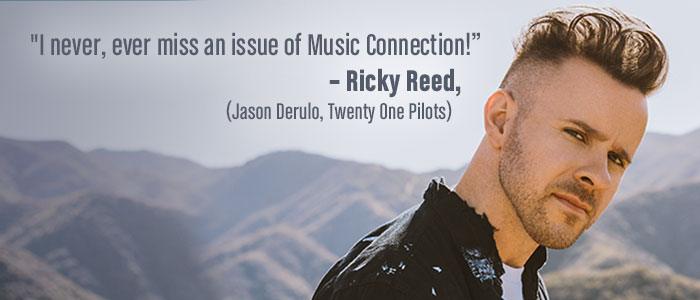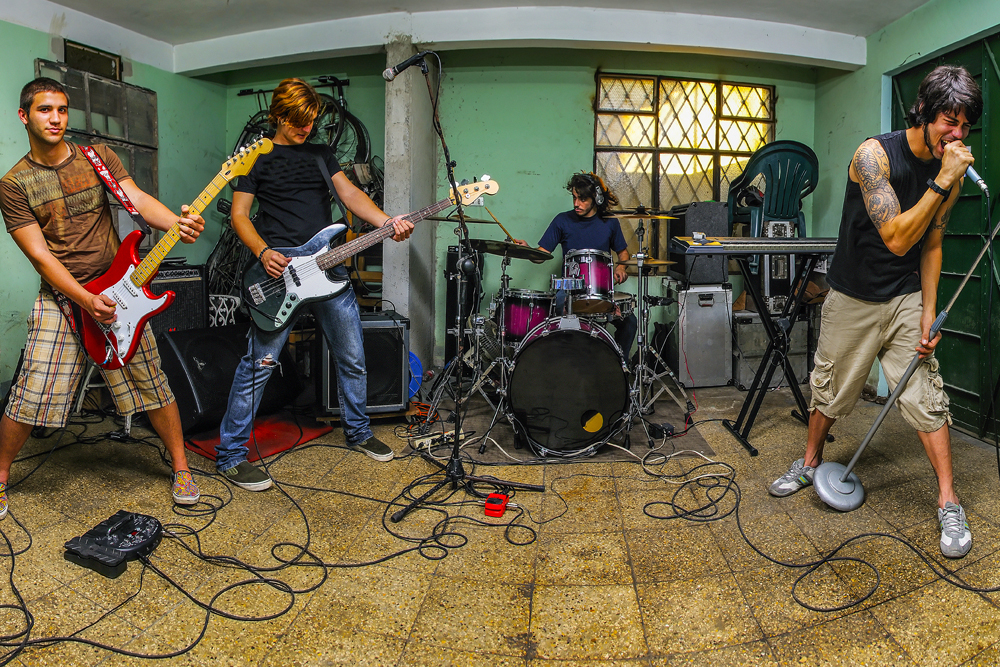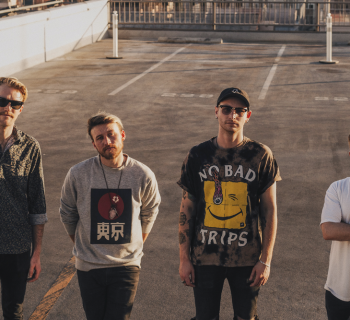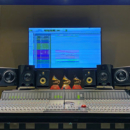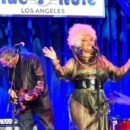At 20 years of age, Madison Beer is already an industry veteran with a colossal Instagram following—12.5 million strong. After releasing a debut EP As She Pleases in 2018 that amassed over 450 million streams worldwide, she is readying her full-length debut. And if the emphatic jolt of her single “Hurts Like Hell” is any indication, it should pack a powerful punch.
Beer first came on the radar as a young teen posting YouTube videos. Somehow, across the vast reaches of the Internet, these performances came to the attention of Justin Bieber who tweeted a link of the then 13-year-old to his huge audience. She subsequently signed to Island Records with representation by Bieber’s manager, Scooter Braun.
But after a series of singles, it was clear that Madison Beer had ideas of her own: about songs, music, image and visuals as she chafed at being viewed as a blank canvas. As she details in this exclusive MC interview: “I would rather fail and be who I am, than be the biggest pop star in the world and not be me.”
Music Connection: Can you tell our readers about the journey you took in negotiating the terms of your own destiny?
Madison Beer: It took a long time for me. I was signed as a young teen, and having your dreams handed to you at that age is something so difficult to comprehend and so mind-boggling. For me I was like “Why should I complain? Why should I speak up? Why should I say I don’t like this song or this video? I’ve won the lottery here.” That was my mentality––I was just so grateful for the opportunity that I had been given. I started resenting myself, and having issues within my own mind with why I was allowing myself to look like I didn’t look, or with people telling me to make changes. And I would talk down to myself.
MC: How did you make the breakthrough transformation that we now witness in your new music?
Beer: I got into this unhealthy battle of thinking I wasn’t good enough to be who I really was, but I broke that habit. And I was like “You know what? I would rather fail and be who I am than be the biggest pop star in the world and not be me.” That’s what it came down to: It was forming a relationship with myself that I was confident enough, I was creative enough, to make my own decisions and talented enough to write my own songs.
It’s really hard to be candid. It’s easier to have a persona that you jump back and forth from and into, then they go through separate things, and you’re separate people that you turn on and off. But it’s been much more fulfilling to be 100 percent myself and honest. And if it takes me 10 years to be selling out Madison Square Garden, I’d rather that, than be selling it out next year without the proper tools behind me.
MC: Your voice is so expressive, with such a wide range. Consequently, it occupies a lot of sonic space within a mix.
Beer: Thank you. I used to hate my voice––I was always comparing myself to other artists and I found myself tearing myself down. “I can’t do this or I can’t do that.” Now I appreciate my voice for what it is. When I write music, I can sing that high register, or go for the low notes.
MC: You co-wrote seven of the songs on As She Pleases, and you are collaborating across the board for the new project. Is it ever difficult to reveal your emotional vulnerability in a room full of co-writers?
Beer: It’s hard for many reasons––you don’t really know who you can trust. Sometimes I will say too much or rant about my personal life in front of people I only met 10 minutes ago, which is not the best thing to do. It’s tough, but it’s also better because my music is conveyed so much more honestly and has more of a sentiment behind it that makes sense with my story. I would rather have my story exposed in a song than not make honest music.
MC: Do your songs evolve from conversations?
Beer: Absolutely yes. I have had so many songs come from conversations. I enjoy writing songs about my own life, but I also really love writing songs about a TV show; about an episode of American Horror Story that I saw last night. I like to be a method songwriter; to be someone else for the time it takes to write a song.
MC: As a young music fan, were you aware that artists relied on songs written by others?
Beer: No! I remember when I first realized that, I was maybe 11 years old, and I was watching MTV with Britney Spears. And she was talking about Max Martin, or one of the guys that wrote one of her songs, and I was like “What? Britney you didn’t write your song?” I was so mind blown and confused.
MC: Your earliest recordings were songs that were written by professional writers and chosen for you to sing. How did this impact your emotional connection to what you were conveying?
Beer: I remember when I got signed I heard demos. And I thought, “This is so weird, I didn’t even write this.” But it became so routine and normal after awhile. But since then I’ve been able to separate myself from the demo world a little bit. Every song on my album I co-wrote. It’s just more special that way. You can get a million great songs from other people, but to make it your own you have to at least change some words, or change the story a little bit, which is what I’ve done with all of my demos. They’ll send me a song that I think is great, and I’m like “Change this line to this or change this word.” My fans know me so well. It would make no sense for them to wonder, “Who is speaking right now?” I have to make it more real.
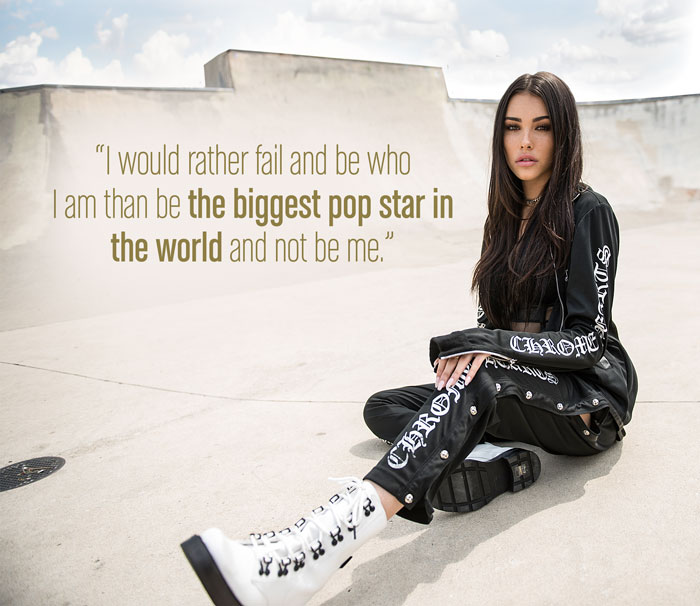 MC: We note that you have loyal followers who have been with you throughout your career from age12-20.
MC: We note that you have loyal followers who have been with you throughout your career from age12-20.
Beer: That’s why we have such a strong core fan base. They’ve watched me grow up, but they were also growing up at the same time. It’s like a big group of brothers and sisters. When I’m going through heartbreak they are too. When I’m whining about getting my period, they are too. We all go through things together, so it’s nice having that family vibe. They also feel for me.
MC: Do you think it’s more difficult for younger people to establish friendships?
Beer: We live in a time and a generation when kids are isolated. Social media has really isolated friendships, interactions and relationships, because you don’t have to look up and talk to your friends because you can be on social media all day. That’s something I’ve experienced in the real world, because I was homeschooled and I only had my teachers. At the end of the day I could go online and have millions of friends and feel like I was popular in school in a very strange way.
MC: Did the homeschooling limit your social abilities?
Beer: Yes and no. I think homeschooling is great, but it’s difficult. I don’t have all the social aspects that a normal kid would. I wish I could say to you that I did get it in other ways, but I am super-different from other people my age. And I have social anxiety issues because of the fact that I never went to high school or middle school or college, and it has sadly damaged me in some ways. But I’ve been able to navigate and understand why I am like the way I am, and fix it. Everyone goes through things differently. I am definitely not a normal 20-year-old.
MC: How do the realities you just described give you a perspective as an artist?
Beer: I think it’s given me more confidence to speak up and have a voice in a room full of adults that are 10 years older than me. I think it’s helped me. I’m more creative and bold because of how I’ve grown up.
MC: You are from the New York area. What was the decision to relocate to Los Angeles?
Beer: It wasn’t a decision. It was, “You have to move to LA.” It was exciting for me, a little premature, but molding. I was sad to leave my friends, but it helped me progress musically. LA is more of a music city than New York.
MC: Do you find Los Angeles inspires you creatively?
Beer: Yes and no. I don’t love LA that much. I will always be a New Yorker. LA is a cool place to live, but I feel creatively stagnant when I’m out here, for some reason. I live in West Hollywood, but my studio is in Sherman Oaks. I feel creative there, in a house in the hills far off.
MC: How do you write and record your tracks?
Beer: We usually write a song on guitar or piano. While the beat is being produced, we write all of the lyrics. I produce too––I don’t know how to physically work Logic or Pro Tools, but I will suggest that the engineers move this, or put this sound here, so I am very involved in the production process. When we record vocals I go in the booth and I sing everything straight through. I don’t like to jump in and out. I sing and then let the producers comp. And if there’s something we didn’t get, I will go back in.
MC: There is a song on your EP, “Teenager in Love,” that has elements of the 1950s. The guitar line sounds like the classic “Sleepwalk” by Santo and Johnny.
Beer: Oh my God, thank you––I love Santo and Johnny. They recorded some of my favorite songs. I have a thing for the ‘50s: Dion and the Belmonts and Paul Anka. I also have a thing for Depeche Mode and Nirvana. Music throughout history is so interesting, how it’s evolved and when people do their own interpolations. I try to know as much as I can from before my time and I enjoy educating myself on these things.
MC: We were fortunate enough to hear some of the new tracks, and they are representative of a powerful new level of your artistry.
Beer: All the new music is so different. I feel finally at peace. It’s like I have been walking around in the wrong size shoes for the past few years, and I have finally found the right size. It’s such a rewarding experience. I’m proud of my new music.
MC: What is the release schedule, and how will it intersect with your touring?
Beer: We had an amazing change of events; we did a session last week and we ended up making three new songs that were so good. The album should be out in June and the tour begins in September, but I will be doing festivals this summer. I’m excited. It’s been a very interesting up and down rollercoaster and it feels good to stand on a stage and be so proud of the music that I’m doing.
MC: Will you tour with a band?
Beer: On the last tour, I went out with a four-piece band––this time I don’t think I’ll travel with a band. I’d rather invest in stage production. I have such a visual mind, and it makes me sad because I really love the way a band sounds. We live in the age of social media and kids want to record things and make them look cool and put them on their Instagrams, so I’d rather make my stage look super sick and have the band prerecorded. I’ll have dancers.
MC: Speaking of the concert experience, is it disconcerting to see an audience experiencing your show while recording the performance on their cell phones?
Beer: I make an announcement at the show. I understand that they want to record and that’s okay, but I ask them to please record from the left or right of their faces; and to not put the phone directly in front of them because I see these kids looking at the concert through the video they’re recording. They can see me through a screen 24/7, but in concert they are getting an opportunity to see me in real life for an hour and a half. I want them to just enjoy it. And a lot of them will put their phones down completely. As long as they’re recording and watching I’m okay with it.
MC: Do you intend to continue as an independent artist?
Beer: I’m at this point where I am considering signing to a major. It would help, but I like being independent. But I’ve been thinking about it.
MC: What would you tell our readers who are navigating their own careers as artists?
Beer: There are ups and downs and behind-the-scenes stuff that people don’t know about. It’s hard. It’s not an easy occupation. Strap yourself in and be prepared.
MC: An astrological question: as a Pisces, how did you overcome the traits of your sign that qualify you as a dreamer?
Beer: (Laughs) I haven’t overcome them. I’m still very much so.
Contact cara.hutchison@ledecompany.com
